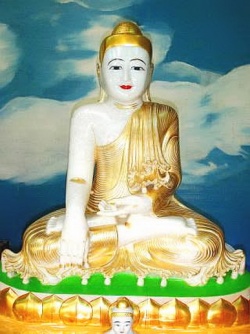Difference between revisions of "Law of Cause and Effect 1"
(Created page with "thumb|250px| <poem> The foundation of Buddhism is the Law of Cause and Effect. Without knowing this deeply, one cannot understand Buddhism or move f...") |
|||
| Line 1: | Line 1: | ||
[[File:Seated Buddha.jpg|thumb|250px|]] | [[File:Seated Buddha.jpg|thumb|250px|]] | ||
| + | |||
| + | |||
| + | |||
<poem> | <poem> | ||
| − | The foundation of Buddhism is the Law of Cause and Effect | + | The foundation of [[Buddhism]] is the [[Law of Cause and Effect]]. |
| − | |||
| − | |||
| − | |||
| − | Every effect has a cause and a condition. | + | Without [[knowing]] this deeply, one cannot understand [[Buddhism]] or move forward on the [[path]]. The [[Law of Cause and Effect]] is made up of these three [[essential]] guidelines: |
| − | A cause and a condition combine to make an effect. | + | |
| − | All effects have a cause. All effects have a condition. There are no exceptions. | + | [[Good deeds]] bring good results. |
| + | [[Bad deeds]] bring bad results. | ||
| + | Your [[own]] [[deeds]] bring your [[own]] results. | ||
| + | |||
| + | Every effect has a [[cause]] and a [[condition]]. | ||
| + | A [[cause]] and a [[condition]] combine to make an effect. | ||
| + | All effects have a [[cause]]. All effects have a [[condition]]. There are no exceptions. | ||
Cause---------------------------------Condition | Cause---------------------------------Condition | ||
| − | + | ||
Effect | Effect | ||
| + | |||
[[File:AdashinoNembutsuji.jpg|thumb|250px|]] | [[File:AdashinoNembutsuji.jpg|thumb|250px|]] | ||
| − | Due to this relationship, the Law of Cause and Effect can more clearly be known as the Law of Cause, Condition, and Effect. | + | Due to this relationship, the [[Law of Cause and Effect]] can more clearly be known as the [[Law of Cause]], [[Condition]], and Effect. |
| − | A law within Buddhism is a rule that penetrates the Three Worlds and Ten Directions. | + | A law within [[Buddhism]] is a {{Wiki|rule}} that penetrates the [[Three Worlds]] and [[Ten Directions]]. |
| − | The Three Worlds are past, present, and future. | + | The [[Three Worlds]] are {{Wiki|past}}, {{Wiki|present}}, and {{Wiki|future}}. |
| − | The Ten Directions are north, south, east, west, northeast, northwest, southeast, southwest, up, and down. | + | |
| − | The Three Worlds represent all time, infinity, always. The Ten Directions means any place, everywhere, all countries on the earth. So the Law of Cause and Effect is applicable everywhere, and it never changes. Even if society changes, this fundamental law in Buddhism never will. | + | The [[Ten Directions]] are [[north]], [[south]], [[east]], [[west]], [[northeast]], [[northwest]], [[southeast]], [[southwest]], up, and down. |
| − | To give an example, let's look at rice. In order for there to be rice, there needs to be a rice seed. But just a rice seed alone cannot make rice. Proper water, sunlight, soil, and labor are required to harvest the rice. A rice seed dropped on the floor will never grow | + | |
| − | + | The [[Three Worlds]] represent all time, [[infinity]], always. The [[Ten Directions]] means any place, everywhere, all countries on the [[earth]]. So the [[Law of Cause and Effect]] is applicable everywhere, and it never changes. Even if [[society]] changes, this [[fundamental law]] in [[Buddhism]] never will. | |
| − | + | ||
| − | + | To give an example, let's look at {{Wiki|rice}}. In order for there to be {{Wiki|rice}}, there needs to be a {{Wiki|rice}} seed. But just a {{Wiki|rice}} seed alone cannot make {{Wiki|rice}}. Proper [[water]], sunlight, soil, and labor are required to harvest the {{Wiki|rice}}. A {{Wiki|rice}} seed dropped on the floor will never grow. | |
| − | So | + | Being born [[human]] is an effect, and so this must have a [[cause]]. Though we are all born [[human]], the [[lives]] we are born into are all different. These different effects must have different [[causes]]. So each [[life]] has its [[own]] different [[cause]]. For examples, the location we're born like {{Wiki|Africa}}, [[Japan]], or the [[Wikipedia:United States of America (USA)|United States]], and the {{Wiki|era}} we were born into differs. |
| − | + | Now there are situations that occur in which we do not know the [[cause]]. Yet there has to be a [[cause]] for those too. Something that happens accidentally doesn't mean it is without a [[cause]]. It is simply not yet known or the {{Wiki|evidence}} is not available. | |
| − | We are living to obtain happiness. Favorable or unfavorable fates are effects. Without knowing their cause, we cannot be happy. We all want to know the causes and effects that determine our fate for better or worse. That's why these three lines are so crucial to learn: | + | [[Master]] [[Shinran]] [[taught]] extensively about the [[Law of Cause and Effect]]. It is an [[essential teaching]] because without it, you cannot understand the [[Vow]] of [[Amida Buddha]] and be saved. |
| + | |||
| + | So what is the {{Wiki|future}} of [[humanity]]? What is the destination for all [[human beings]]? | ||
| + | |||
| + | [[Happiness]] [[Unhappiness]] | ||
| + | |||
| + | We are living to obtain [[happiness]]. Favorable or unfavorable fates are effects. Without [[knowing]] their [[cause]], we cannot be [[happy]]. We all want to know the [[causes]] and effects that determine our [[fate]] for better or worse. That's why these three lines are so crucial to learn: | ||
[[File:Sb8.jpg|thumb|250px|]] | [[File:Sb8.jpg|thumb|250px|]] | ||
| − | Good deeds bring good results. | + | [[Good deeds]] bring good results. |
| − | Bad deeds bring bad results. | + | [[Bad deeds]] bring bad results. |
| − | Your own deeds bring your own results. | + | Your [[own]] [[deeds]] bring your [[own]] results. |
| − | To see cause and effect clearly, let's use for example fruits and vegetables. Planting a watermelon seed yields a watermelon. Planting a radish seed yields a radish. You harvest only what you yourself have planted. | + | To see [[cause and effect]] clearly, let's use for example {{Wiki|fruits}} and vegetables. Planting a watermelon seed yields a watermelon. Planting a radish seed yields a radish. You harvest only what you yourself have planted. |
Watermelon seed ---> Watermelon | Watermelon seed ---> Watermelon | ||
Radish seed ---------> Radish | Radish seed ---------> Radish | ||
| − | Own effort ----------> Own result | + | [[Own]] [[effort]] ----------> [[Own]] result |
It is impossible to plant a watermelon seed and get a radish, or plant a radish seed and get a watermelon. It will never happen in a million years. | It is impossible to plant a watermelon seed and get a radish, or plant a radish seed and get a watermelon. It will never happen in a million years. | ||
| − | Likewise, good effects or a favorable fate can only have come from a good cause. Bad effects or an unfavorable fate can only have come from a bad cause. The relationship of this principle penetrates the Three Worlds and the Ten Directions. | + | Likewise, good effects or a favorable [[fate]] can only have come from a good [[cause]]. |
| − | A good cause is the equivalent to a good deed or action. | + | |
| − | A bad cause is the equivalent of a bad deed or action. | + | Bad effects or an unfavorable [[fate]] can only have come from a bad [[cause]]. The relationship of this [[principle]] penetrates the [[Three Worlds]] and the [[Ten Directions]]. |
| − | Suffering from a bad fate, we say we're unlucky or we've been hit by bad luck. But how does luck determine favorable or unfavorable fates? Many attribute it to a god or the curse of an ancestor. But still the reason remains shrouded in vague, unclear answers. | + | |
| + | A good [[cause]] is the {{Wiki|equivalent}} to a good [[deed]] or [[action]]. | ||
| + | |||
| + | A bad [[cause]] is the {{Wiki|equivalent}} of a bad [[deed]] or [[action]]. | ||
| + | [[Suffering]] from a bad [[fate]], we say we're unlucky or we've been hit by bad [[luck]]. But how does [[luck]] determine favorable or unfavorable fates? Many attribute it to a [[god]] or the curse of an [[ancestor]]. But still the [[reason]] remains shrouded in vague, unclear answers. | ||
[[File:Sb80.jpg|thumb|250px|]] | [[File:Sb80.jpg|thumb|250px|]] | ||
| − | Our deeds and our actions determine our fates. Good deeds and actions will result in a good fate. Bad deeds and actions will result in a bad fate. To obtain happiness, we have to do good. No one wants to suffer a bad fate, but we can only avoid a bad fate by not doing bad. This truth penetrates the Three Worlds and the Ten Directions, both timeless and universal. | + | |
| − | Never has there ever been a case where a good deed has produced a bad effect. Never also has there been a bad deed performed that led to a good effect. Whether we're happy or not is caused solely by the deeds we perform. | + | Our [[deeds]] and our [[actions]] determine our fates. [[Good deeds]] and [[actions]] will result in a good [[fate]]. [[Bad deeds]] and [[actions]] will result in a bad [[fate]]. To obtain [[happiness]], we have to do good. No one wants to [[suffer]] a bad [[fate]], but we can only avoid a bad [[fate]] by not doing bad. This [[truth]] penetrates the [[Three Worlds]] and the [[Ten Directions]], both timeless and [[universal]]. |
| − | If a student studies hard, they will get good grades and eventually be employed. We can see clearly how the cause, studying diligently, led to the effect of getting good grades. How deeply you believe in the Law of Cause and Effect shows how deeply you believe in Buddhism. When we think of stealing, we refrain ourselves from doing so in order to avoid the bad effect of being arrested. Again these ideals remain valid throughout the Three Worlds and the Ten Directions. | + | |
| − | What you sow, you shall reap. The concept of own cause own effect is very important and easily misunderstood. All of our fate at this moment has been brought on by our own deeds. It is our own deeds not those of others. | + | Never has there ever been a case where a good [[deed]] has produced a bad effect. Never also has there been a bad [[deed]] performed that led to a good effect. Whether we're [[happy]] or not is [[caused]] solely by the [[deeds]] we perform. |
| + | |||
| + | If a [[student]] studies hard, they will get good grades and eventually be employed. We can see clearly how the [[cause]], studying diligently, led to the effect of getting good grades. How deeply you believe in the [[Law of Cause and Effect]] shows how deeply you believe in [[Buddhism]]. When we think of [[stealing]], we refrain ourselves from doing so in order to avoid the bad effect of being arrested. Again these ideals remain valid throughout the [[Three Worlds]] and the [[Ten Directions]]. | ||
| + | What you sow, you shall reap. The {{Wiki|concept}} of [[own]] [[cause]] [[own]] effect is very important and easily misunderstood. All of our [[fate]] at this [[moment]] has been brought on by our [[own]] [[deeds]]. It is our [[own]] [[deeds]] not those of others. | ||
| + | |||
[[File:Sb73.jpg|thumb|250px|]] | [[File:Sb73.jpg|thumb|250px|]] | ||
| − | We think in our minds constantly: others' cause, my effect. We think that someone else's deeds bring our effects. We constantly blame others for our misfortune. But this is completely wrong. There is not a single case where occurred. It is not true in the Three Worlds and the Ten Directions. All phenomenon occurs by own cause, own effect. | + | We think in our [[minds]] constantly: others' [[cause]], my effect. We think that someone else's [[deeds]] bring our effects. We constantly blame others for our misfortune. But this is completely wrong. There is not a single case where occurred. It is not true in the [[Three Worlds]] and the [[Ten Directions]]. All [[phenomenon]] occurs by [[own]] [[cause]], [[own]] effect. |
| − | When we're happy we accept the Law of Cause and Effect gladly. I worked really hard to enjoy these results. What I have sewn I am now reaping! But when tides turn and we are in a bad circumstance, we no longer believe it to be true. Yet when we're in trouble or in the wake of a natural disaster we do not think, what I have sewn I am reaping now. We persist otherwise, this cannot be me. | + | |
| − | If you cannot believe that this is the case in bad times, then truly you don't believe that good times are of your doing either. It's just not the case that others' causes bring own effect. Some may ponder why was I born as the son of horrible parents? They are in miserable situations, and they often hold a grudge on society or other people. But a seed you haven't planted will never occur to anyone rest assured. Others' cause own effect will never occur. Never in life. | + | When we're [[happy]] we accept the [[Law of Cause and Effect]] gladly. I worked really hard to enjoy these results. What I have sewn I am now reaping! But when tides turn and we are in a bad circumstance, we no longer believe it to be true. Yet when we're in trouble or in the wake of a natural {{Wiki|disaster}} we do not think, what I have sewn I am reaping now. We persist otherwise, this cannot be me. |
| − | An example of this is in the story of the thief who blamed the rope. A thief went out and stole someone's belongings. Then he was caught by a rope. He began to suffer and cursed the rope for doing it to him. Who created the pain for this thief? What's the cause? The thief believed it was the rope However had he not stolen, there would not have been a rope. The thief must blame his own crime, created by his own actions. | + | |
| − | We study hard, and then we can get into a top university. We steal and we meet with misfortune. But do we really understand this point? When we suffer from trouble we know there must be a cause. The actions of someone else quickly become our target. | + | If you cannot believe that this is the case in bad times, then truly you don't believe that good times are of your doing either. It's just not the case that others' [[causes]] bring [[own]] effect. Some may ponder why was I born as the son of horrible [[parents]]? They are in [[miserable]] situations, and they often hold a [[grudge]] on [[society]] or other [[people]]. But a seed you haven't planted will never occur to anyone rest assured. Others' [[cause]] [[own]] effect will never occur. Never in [[life]]. |
| − | If someone else is drinking alcohol, do you receive the effects of being drunk instead of them? How about you exercise and your friend gets healthier instead? No, if you're cautious with your diet, it's you who becomes leaner. The effects only occur to the person on the diet and their efforts. | + | |
| − | If you deeply believe in the Law of Cause and Effect, you must lament your misfortunes deeply as your own doing. We tend to instead sympathize with the thief tied down by the rope in those cases. We hold grudges and blame others which shows ignorance of the Law of Cause and Effect. | + | An example of this is in the story of the thief who blamed the rope. A thief went out and stole someone's belongings. Then he was caught by a rope. He began to [[suffer]] and cursed the rope for doing it to him. Who created the [[pain]] for this thief? What's the [[cause]]? The thief believed it was the rope However had he not stolen, there would not have been a rope. The thief must blame his [[own]] [[crime]], created by his [[own]] [[actions]]. |
| − | In the next post, I will review this article and go over the incorrect notion of others' cause own effect. | + | |
| + | We study hard, and then we can get into a top {{Wiki|university}}. We steal and we meet with misfortune. But do we really understand this point? When we [[suffer]] from trouble we know there must be a [[cause]]. The [[actions]] of someone else quickly become our target. | ||
| + | |||
| + | If someone else is drinking [[alcohol]], do you receive the effects of being drunk instead of them? How about you exercise and your [[friend]] gets healthier instead? No, if you're {{Wiki|cautious}} with your [[diet]], it's you who becomes leaner. The effects only occur to the [[person]] on the [[diet]] and their efforts. | ||
| + | |||
| + | If you deeply believe in the [[Law of Cause and Effect]], you must [[lament]] your misfortunes deeply as your [[own]] doing. We tend to instead sympathize with the thief tied down by the rope in those cases. We hold grudges and blame others which shows [[ignorance]] of the [[Law of Cause and Effect]]. | ||
| + | |||
| + | In the next post, I will review this article and go over the incorrect notion of others' [[cause]] [[own]] effect. | ||
--------------------------------------------------------------------------------------------------------------------- | --------------------------------------------------------------------------------------------------------------------- | ||
| − | Reference: This three-part series on the Law of Cause and Effect is written from lecture notes. The seminar was taught by Takamori Kentetsu, the current living master of Pure Land Buddhism. | + | Reference: This three-part series on the [[Law of Cause and Effect]] is written from lecture notes. The seminar was [[taught]] by Takamori Kentetsu, the current living [[master]] of [[Pure Land Buddhism]]. |
</poem> | </poem> | ||
{{R}} | {{R}} | ||
[http://mirrorofdharma.blogspot.com.au/2012/08/the-law-of-cause-and-effect.html mirrorofdharma.blogspot.com.au] | [http://mirrorofdharma.blogspot.com.au/2012/08/the-law-of-cause-and-effect.html mirrorofdharma.blogspot.com.au] | ||
[[Category:Law of Cause and Effect]] | [[Category:Law of Cause and Effect]] | ||
Revision as of 05:47, 26 February 2016
The foundation of Buddhism is the Law of Cause and Effect.
Without knowing this deeply, one cannot understand Buddhism or move forward on the path. The Law of Cause and Effect is made up of these three essential guidelines:
Good deeds bring good results.
Bad deeds bring bad results.
Your own deeds bring your own results.
Every effect has a cause and a condition.
A cause and a condition combine to make an effect.
All effects have a cause. All effects have a condition. There are no exceptions.
Cause---------------------------------Condition
Effect
Due to this relationship, the Law of Cause and Effect can more clearly be known as the Law of Cause, Condition, and Effect.
A law within Buddhism is a rule that penetrates the Three Worlds and Ten Directions.
The Three Worlds are past, present, and future.
The Ten Directions are north, south, east, west, northeast, northwest, southeast, southwest, up, and down.
The Three Worlds represent all time, infinity, always. The Ten Directions means any place, everywhere, all countries on the earth. So the Law of Cause and Effect is applicable everywhere, and it never changes. Even if society changes, this fundamental law in Buddhism never will.
To give an example, let's look at rice. In order for there to be rice, there needs to be a rice seed. But just a rice seed alone cannot make rice. Proper water, sunlight, soil, and labor are required to harvest the rice. A rice seed dropped on the floor will never grow.
Being born human is an effect, and so this must have a cause. Though we are all born human, the lives we are born into are all different. These different effects must have different causes. So each life has its own different cause. For examples, the location we're born like Africa, Japan, or the United States, and the era we were born into differs.
Now there are situations that occur in which we do not know the cause. Yet there has to be a cause for those too. Something that happens accidentally doesn't mean it is without a cause. It is simply not yet known or the evidence is not available.
Master Shinran taught extensively about the Law of Cause and Effect. It is an essential teaching because without it, you cannot understand the Vow of Amida Buddha and be saved.
So what is the future of humanity? What is the destination for all human beings?
Happiness Unhappiness
We are living to obtain happiness. Favorable or unfavorable fates are effects. Without knowing their cause, we cannot be happy. We all want to know the causes and effects that determine our fate for better or worse. That's why these three lines are so crucial to learn:
Good deeds bring good results.
Bad deeds bring bad results.
Your own deeds bring your own results.
To see cause and effect clearly, let's use for example fruits and vegetables. Planting a watermelon seed yields a watermelon. Planting a radish seed yields a radish. You harvest only what you yourself have planted.
Watermelon seed ---> Watermelon
Radish seed ---------> Radish
Own effort ----------> Own result
It is impossible to plant a watermelon seed and get a radish, or plant a radish seed and get a watermelon. It will never happen in a million years.
Likewise, good effects or a favorable fate can only have come from a good cause.
Bad effects or an unfavorable fate can only have come from a bad cause. The relationship of this principle penetrates the Three Worlds and the Ten Directions.
A good cause is the equivalent to a good deed or action.
A bad cause is the equivalent of a bad deed or action.
Suffering from a bad fate, we say we're unlucky or we've been hit by bad luck. But how does luck determine favorable or unfavorable fates? Many attribute it to a god or the curse of an ancestor. But still the reason remains shrouded in vague, unclear answers.
Our deeds and our actions determine our fates. Good deeds and actions will result in a good fate. Bad deeds and actions will result in a bad fate. To obtain happiness, we have to do good. No one wants to suffer a bad fate, but we can only avoid a bad fate by not doing bad. This truth penetrates the Three Worlds and the Ten Directions, both timeless and universal.
Never has there ever been a case where a good deed has produced a bad effect. Never also has there been a bad deed performed that led to a good effect. Whether we're happy or not is caused solely by the deeds we perform.
If a student studies hard, they will get good grades and eventually be employed. We can see clearly how the cause, studying diligently, led to the effect of getting good grades. How deeply you believe in the Law of Cause and Effect shows how deeply you believe in Buddhism. When we think of stealing, we refrain ourselves from doing so in order to avoid the bad effect of being arrested. Again these ideals remain valid throughout the Three Worlds and the Ten Directions.
What you sow, you shall reap. The concept of own cause own effect is very important and easily misunderstood. All of our fate at this moment has been brought on by our own deeds. It is our own deeds not those of others.
We think in our minds constantly: others' cause, my effect. We think that someone else's deeds bring our effects. We constantly blame others for our misfortune. But this is completely wrong. There is not a single case where occurred. It is not true in the Three Worlds and the Ten Directions. All phenomenon occurs by own cause, own effect.
When we're happy we accept the Law of Cause and Effect gladly. I worked really hard to enjoy these results. What I have sewn I am now reaping! But when tides turn and we are in a bad circumstance, we no longer believe it to be true. Yet when we're in trouble or in the wake of a natural disaster we do not think, what I have sewn I am reaping now. We persist otherwise, this cannot be me.
If you cannot believe that this is the case in bad times, then truly you don't believe that good times are of your doing either. It's just not the case that others' causes bring own effect. Some may ponder why was I born as the son of horrible parents? They are in miserable situations, and they often hold a grudge on society or other people. But a seed you haven't planted will never occur to anyone rest assured. Others' cause own effect will never occur. Never in life.
An example of this is in the story of the thief who blamed the rope. A thief went out and stole someone's belongings. Then he was caught by a rope. He began to suffer and cursed the rope for doing it to him. Who created the pain for this thief? What's the cause? The thief believed it was the rope However had he not stolen, there would not have been a rope. The thief must blame his own crime, created by his own actions.
We study hard, and then we can get into a top university. We steal and we meet with misfortune. But do we really understand this point? When we suffer from trouble we know there must be a cause. The actions of someone else quickly become our target.
If someone else is drinking alcohol, do you receive the effects of being drunk instead of them? How about you exercise and your friend gets healthier instead? No, if you're cautious with your diet, it's you who becomes leaner. The effects only occur to the person on the diet and their efforts.
If you deeply believe in the Law of Cause and Effect, you must lament your misfortunes deeply as your own doing. We tend to instead sympathize with the thief tied down by the rope in those cases. We hold grudges and blame others which shows ignorance of the Law of Cause and Effect.
In the next post, I will review this article and go over the incorrect notion of others' cause own effect.
Reference: This three-part series on the Law of Cause and Effect is written from lecture notes. The seminar was taught by Takamori Kentetsu, the current living master of Pure Land Buddhism.




